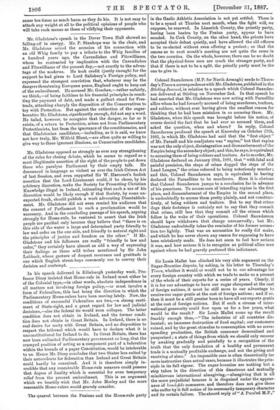Mr. Gladstone's speech in the Dover Town Hall showed no
falling-off in energy. Mr. P. Stanhope was in the chair, and Mr. Gladstone seized the occasion of his connection with an old Whig family to pay a tribute to the Whig families of a hundred years ago, the Cavendishes and Fitzwilliams, whom he contrasted by implication with the Cavendishes and Illtzwilliams of the present day,—not exactly to the advan- tage of the moderns. He took credit (justly enough) for the support he bad given to Lord Salisbury's Foreign policy, and expressed the strongest conviction that, whatever may be the dangers threatening European peace, England ought to keep out of the embroilment. He accused Mr. Goschen,—rather unfairly, we think,—of being faithless to his financial principles in remit- ting the payment of debt, and made a gallant stand for Free- trade, attacking sharply the disposition of the Conservatives to toy with Protection. But against the extinction of the sugar- bounties Mr. Gladstone, significantly enough, did not say a word. He failed, however, to recognise that the danger, so far as it exists, of a return to Protection, arises not from Parliamentary Protectionists, but from the ignorance of the constituencies, and that Gladstonian candidates,—including, as it is said, we know not bow truly, Mr. Wilfrid Blunt, —are often quite as willing to give way to these ignorant illusions, as Conservative candidates.






































 Previous page
Previous page